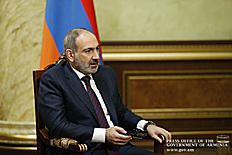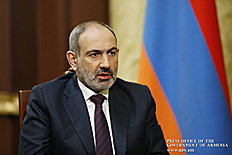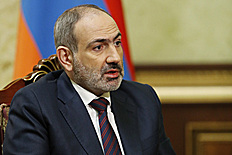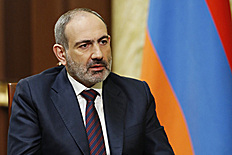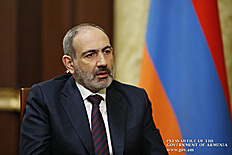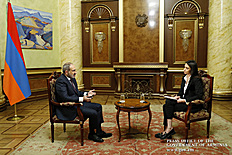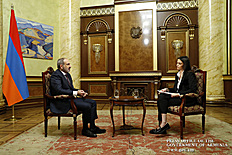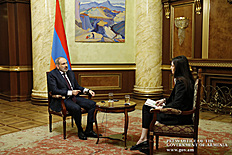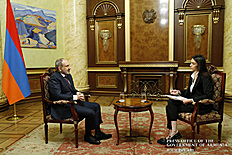Interviews and press conferences
PM answers media representatives’ questions in online press conference
more 6 photos
On November 16, Prime Minister Nikol Pashinyan answered the questions asked by more than a dozen media representatives in an online press conference aired and streamed live on the Internet. Below is the full transcript of Prime Minister Nikol Pashinyan’s press conference.
Spokesperson for the Prime Minister Mane Gevorgyan – Good afternoon, dear colleagues. We applied to 12 media outlets and asked them to send us one question each. I am now going to ask the Prime Minister to answer your questions.
Mr. Prime Minister, before moving on to the main issues, I would like to talk about the post you made yesterday. You are aware that it has been widely criticized and was even seen as a call for civil war. Please comment thereon.
Prime Minister Nikol Pashinyan - Thank you. Our society is having a tough time for obvious reasons. As regards yesterday’s post, I can say that some of the reactions showed the way manipulative mechanisms can work in situations like this, especially in this time of social tensions.
I suggest we just read what I wrote in my post. What did I write in that post? I wrote, “I watched dozens of videos of frontline soldiers today. You are well aware that after November 9 - after the well-known events - volunteers and Armenian soldiers shot videos in the frontline and published them on the web, in which they voiced support for the government by analyzing and assessing the situation. And in the next sentence I said, “I am amazed at our guys’ insight.” There were in-depth analyses in their comments concerning the events that took place before their eyes. I wrote next, “Guys, you are right.” That is, I agree with their interpretation of many events. “I am waiting for you in Yerevan” is just the sentence that has led many to say that there is a call for civil war and clashes.
First of all, I would like to call our compatriots’ attention to the fact that many of those soldiers were demobilized and returned to their families following the well-known events. Many of those people, those groups, and even individual army units keep sending me messages that they want to meet with me. And I considered it necessary to state publicly that I was going to organize a meeting in order to discuss key issues with them.
The next sentence is “To deal with those who are whimpering under the walls.” Of course, there is a rather strict wording here, but considering that we learned yesterday that this phrase is also used by official bodies in their statements, yes, I used this wording, what does this mean in general? This means that after the soldiers are back front the frontline, the problem will be definitively settled. I just meant we thereby could quell the allegations that Armenia’s military-political leadership had been involved in plots, conspiracies, etc., and so on.
Who but the soldier on the frontline best knows the answer to this question?, It is extremely important for me to communicate with those guys, to hear their opinion. And, by the way, since we are talking about clashes, let me say that no armed man is allowed to return to the Republic of Armenia from the frontline, because there are special checkpoints where the law enforcement authorities - Military Police, Police, NSS – are escorting these groups to army units, where they hand over their weapons in the prescribed manner. Yesterday I talked with the head of the Military Police on this topic and told him to rule out that anyone be back to Yerevan with weapons.
I am referring to those comments which can be interpreted in different ways. Yes, sometimes we can hear a very harsh language in the videos coming from the frontline. Of course, I am worried about it, but I want to draw your attention to the following fact: what is the reason for this? We all saw what happened in Yerevan on the night of November 9-10. The government building was attacked, the building of the National Assembly and the Kond’s mansions were destroyed.
And I want to draw your attention to the fact that those acts of violence were not condemned by political forces. This is a very important fact. Even the Armenian ombudsman failed to condemn the attacks. This is a very important fact. Instead, we heard words of condemnation coming from the frontlines. In this context, I think that we should indeed rule out hate speech and civil strife in Armenia. Who is talking about civil war? I want to say that the law enforcement system of Armenia, the police of the Republic of Armenia and the National Security Service have enough capacity to prevent manifestations like that. A question may arise here: “Well, if that was the case, why nothing was done to prevent it on the night of November 9-10?” Because the same police forces, a very large part of the National Security Service, even the State Security Service, were on the frontlines. And, in fact, the Police, the National Security Service and the State Guard Service had limited forces left in Yerevan.
But what does this mean? The government and the authorities are accused of conspiracy, that is, the Government, the State Security Service, the Police, the National Security Service go to protect the homeland’s borders, leaving themselves defenseless. Is this a way to enter into conspiracies? I mean that the speculations about to my yesterday’s post are inappropriate. Absolutely inappropriate. I do believe that the demobilized soldiers returning from the frontline have the right to voice an opinion. And I do not think there is anything reprehensible in that they want to meet me. They know the truth about the recent events, don’t they?
If it turns out that there was a conspiracy, or there is a conspiracy, let it be revealed, all the guilty will be punished. But, sorry, it is difficult to give an assessment from Yerevan or it is not easy to give an assessment for those who do not have complete information. Those guys need to be listened to. For instance, I want to hear their opinion. Is there anything to blame? I am convinced that there is no military-political conspiracy. But I have to listen to those guys as they are talking about important episodes. Let us understand what happened and why happened. Let us see whether there are any culprits who should be punished? I want to say that I consider it absolutely inappropriate.
What does a call for civil war mean? Can the Prime Minister call for a civil war? No, but many people say, yes. Such manipulative approaches need to be downplayed. And I think the people who are there... By the way, the government has all necessary leverages and powers to use if we were to get the frontline soldiers involved in resolving the current political situation. Martial law also enables the involvement of the Armed Forces to assist in maintaining public order. In other words, is there a need to post on a social network calls like that as seen from that perspective? Therefore, I hope our compatriots perceived my point correctly; at least those who did not understand it the right way will reconsider their opinion after my comments.
Spokesperson for the Prime Minister Mane Gevorgyan - Thank you, Mr. Prime Minister. Let us proceed to the questions.
Aravot daily, Luiza Sukiasyan - War is said to be the continuation of politics. Do you admit that the war is a consequence of your policy? And if not, who is responsible for the territorial losses we had, thousands of casualties and displaced people?
Prime Minister Nikol Pashinyan - There is no doubt for me and there is no misunderstanding that I am the number one official who is responsible for what happened. There is no misinterpretation in this matter. I understand that I owe it to myself and I am facing the people’s trial, to put it sharply. But people must know the necessary details to be able to come to conclusions in this case. In other words, there should be a dialog on the matter at hand by listening to servicemen, to the opposition, to the government. Listening to everyone is a crucial and integral part of this process.
And I think it is possible to record what happened. And the following happened that as of May 2018, the talks on the settlement of the Nagorno-Karabakh conflict had crossed the point of no return, when, in fact, the issue had embraced the logic of giving up “territories for nothing.” Now, if you look closely at the media field, you will see, for example, that many Republicans have disclosed their notes and the forecasts made in 2018, which evidence that there might be problems in settling the Nagorno-Karabakh issue, and even lands might be handed over.
There are 3 options here: either those people were just prophets to predict and state that our government and I came to power for conspiracies, that I came to power with a malicious intent to create problems for Artsakh; but there is a third option, namely that those people were just aware what point the talks process was left on, where it had reached, what inevitable concessions were imposed on the Republic of Armenia.
Now let me talk about my policy in that context. My policy was to try not to accept all that and to change the logic. And, in fact, now we can say that, unfortunately, we did not succeed. We did not succeed in that, because before the war we faced a situation, where in fact there was an international consensus that territories should be handed over to Azerbaijan without any preconditions.
Our policy was to try to change that logic. And yes, we have not been able to change that logic; perhaps we failed to properly assess the possibilities of changing that logic. But, on the other hand, if we did not evaluate correctly, what should we have done, should we have come to terms with it? For example, I could not accept it, and I tried to do everything to build up Armenia’s resistance to this issue.
I tried my best to drastically increase the fighting efficiency of our Armed Forces and the level of armament over the past 2 years. But if we look at it in the context of that issue, we are just being blamed for the opposite. For example, they accuse us of saying that we have actually signed a paper to hand over territories. On the other hand, we are criticized for not having signed a document earlier to hand over those territories. In other words, they accuse us of handing over lands and at the same time of not having surrendered them earlier. The reason is quite simple. I have already said that our army, our Armed Forces fought, resisted as long as that resistance had a specific strategic-tactical meaning and goal. On the other hand, we are accused of the opposite.
We are accused of such a high death toll suffered during the war, and at the same time, we are accused of taking such steps as to avoid casualties, to get our 20-35 thousand-strong troops out of an imminent blockade. Of course, I am personally responsible for this. It is my fault first of all. But in order to bear that responsibility fully, I consider it necessary that all the circumstances be clarified in every detail. All the details and circumstances should be exposed to the public at large. And that is the purpose of this debate, one of the possible purposes.
Armenia TV, Zohrab Haroyan - At the beginning of your tenure you said you were going to start negotiating from your own point. What is your own point in the negotiations now?
Prime Minister Nikol Pashinyan - Look, this is the continuation of the same issue. What did I mean by saying “my own point?” I meant that we were trying to disagree with that logic. That was the point. As for that new point, we need to analyze, formulate an agenda on the current situation and we must serve that very agenda, in particular, by focusing on the issue of the status of Nagorno-Karabakh.
The most important point is that the people of Nagorno-Karabakh must live in Nagorno-Karabakh. Nagorno-Karabakh’s status must be at the heart of the negotiation process along with humanitarian issues, communications issues, transport issues, and so on.
Public TV News Service, Shoghik Galstyan - Political forces are voicing that they can make the points of that statement more pro-Armenian. Why is there no dialogue with those forces?
Prime Minister Nikol Pashinyan - To be honest, I have not had such an offer from political forces. But I still want to say that this document is not an expression of political aspirations, but of a specific military situation, which, unfortunately, we had in this situation. In fact, to change the document retroactively means to change the military situation, which, I think, at least today is not a realistic task. As for further negotiations, there are many provisions in the document that still need to be interpreted. Of course, all ideas and all suggestions should be brought together while interpreting them; we will try to materialize the best suggestions.
Shant TV, Aram Abrahamyan - Mr. Prime Minister, if the National Assembly members, not only from your faction, the ministers, the members of government, the President of the Republic of Armenia were not aware of the well-known statement, of your decision. Does that not mean that the aforementioned institutions simply do not work: they are in crisis? Don’t you think that we need to find viable legal successors to these institutions through snap elections?
Prime Minister Nikol Pashinyan - First of all, I would like to say that during this war we had at least two sessions of the Security Council, attended by the President of the Republic, one of the sessions - by His Holiness, as well as by the representatives of parliamentary factions. We also had meetings with representatives of political forces, discussions took place, and they were aware of the trends in general.
Yes, there were many nuances related to specificity that could not be considered. Because, as I have already said, there was a situation when a decision had to be made within hours, in a very limited time, and those decisions were made in within limited timeframes in consultation with the General Staff of the Armed Forces, the political leadership of Artsakh, because specific events were unfolding, which had to be responded to very quickly.
As for institutional activities, the institutions are functioning and will function, of course. I think it is crucial now that we achieve full stability in the Republic of Armenia, public safety, we must focus on that issue today. The parliament, the President of the Republic, all the other institutions should go working ahead, and all our activities should be specifically aimed at ensuring stability and security. And let me say that these institutions are viable as they have a mandate to act.
Public Radio, Hasmik Dilanyan - What is being done to find the missing soldiers? How many missing persons have we today? When the exchange of prisoners will start?
Prime Minister Nikol Pashinyan - Yes, the numbers are known. I will not publish a specific number now, but we have the figure. Unfortunately, we are talking about a few hundred of our soldiers who are missing. We hope that the actual figures are not that big. We hope to find some alive, if not healthy, then at least alive. For example, yesterday I learned that a wounded soldier who had previously been considered missing was found. As for the exchange of prisoners, it will take place after the exchange of bodies.
And, by the way, there were suggestions that a day of mourning should be declared. I want to say that I think it would be right for that decision to be made when we have completed the process of identifying the bodies in order to have the opportunity to pay tribute within the framework of decisions made at a state level.
I also consider it important for us to provide social guarantees for the families of our perished servicemen, as well as social guarantees for servicemen with disabilities. The government is taking relevant action; we are confident that all this will be done in the proper manner. Of course, I consider it important to communicate with the families of the victims. Communication between victims’ families must be continuous. I spoke about the contacts with and between soldiers in answering the first question.
I think it important to communicate with the disabled soldiers, because the organization of their future life is one of the most important issues, the government must play a very active role here. Our soldiers must see that the homeland, the state is standing by them. It is obvious that the solution of health problems is not even a topic of discussion, there is nothing to discuss there. There is nothing to discuss on what is provided for by the applicable law.
But it is crucial for the government to supports those disabled servicemen facing training issues in organizing their future lives. And this must become one of the most important directions of our activity.
Azatutyun Radio, Artak Hambardzumyan - The fall of Shushi has raised many questions among the public and experts. Opinions are voiced that as a fortress city, Shushi was impregnable and it could not fall but after fierce fighting. Can you detail why and how Shushi fell?
You mentioned in your latest interview that to stop the war, they demanded to hand over Shushi before the city fell. Which side made such a demand? Can you detail what proposals and options had been offered by Russia and Azerbaijan for halting the hostilities since the beginning of the war?
Prime Minister Nikol Pashinyan - First of all, I wish to stress that there is an important piece of misinformation relating to Shushi, because many say that Shushi has just been surrendered. Today I read a post by the President of Artsakh, where he regretfully noted that the dead bodies of more than 100 Armenian soldiers had been found in Shushi. If Shushi was surrendered, the question may arise whether those soldiers had been fighting or not over there.
Moreover, there was much talk about an allegedly conspiratorial decision concerning Shushi. I would like to inform you that the law enforcement agencies invited the author of that statement. I am aware that they invited him in an effort to get specific information about the conspirators, what the conspiracy consisted in, how it happened, etc. As far as I know, the author of that statement avoided giving specific answers. If there is an act of treason, if someone claims to have specific information about treachery without providing further details to law enforcement agencies, the only conclusion one can draw is that he or she has attended that act of treason. If someone says that he or she does not trust the law enforcement agencies and therefore cannot give away details, let him make a public statement, let him publicly announce who made that statement, what really happened. What was officially announced had happened in fact. At first subversive squads, then larger armed units penetrated the city in groups, and we unfortunately lost Shushi.
As for the second part of the question. The point is that I used to talk about a nuance in my interviews held during the war, namely that starting from the talks launched in 2011, every time any compromise was acceptable to Armenia - the Armenian side - it turned out to be unacceptable for Azerbaijan. I repeat, I made a note during the war that for example we could have avoided war, if we had agreed to hand over 7 regions to Azerbaijan, including Shushi. Yes, we could, but was that the policy we wanted to pursue? No, that was not our policy. And the Artsakh Defense Army, the Government of Armenia, our Armed Forces decided to accept the challenge. Unfortunately, it did not bring us the desired result also because the inevitability of a defeat could be felt on the frontline since the very first day. And the political figures who from the first day of the war called for handing over territories at the cost of stopping the war today accuse the Government of treason for the same thing.
As regards, the difference between sooner or later, I just want our compatriots to understand this nuance as well. In fact, the difference between sooner or later is not substantive, because it was in that issue. The condition for the surrender of Shushi was set if not from the outset, at least in the initial period. And why did we, the Artsakh authorities, the Defense Army go this way? As long as there was an opportunity to defend, even a theoretical opportunity to defend it all, the Defense Army, the General Staff of the Armenian Armed Forces, decided to fight to the last. They fought heroically until the last moment. I want us all to record this. But, unfortunately, we were unable to live up to the task. Are we responsible for that? Yes, we are responsible for that. Because over the past two and a half years we did not manage to complete what had not been done for decades. Yes, we are, of course, responsible for that.
Radio Sputnik, Hovhannes Shoghikyan – During one of Roman Babayan’s TV show aired of late, Margarita Simonyan asked you if it was true that you had been holding counsel with U.S. representatives for a long time on whether to accept or not the Russian proposal.
Prime Minister Nikol Pashinyan - Of course, not. I have only had 5 conversations with U.S. officials during all this month - three times with National Security Adviser to the U.S. President O’Brien, and twice with U.S. Secretary of State Pompeo. It was not the Russian proposals that we discussed, but the American proposals, except for the first call, which was my first ever conversation with Mr. O’Brien in general.
When the United States initiated a ceasefire, the Russian proposals had not been discussed at all with the American side. While I was in constant contact with the President of Russia, there was a day when we talked on the phone 5 or 6 times. What you say is perfect nonsense. And let me say, that such manipulations are just strange.
Fact daily, Anna Badalyan - Mr. Pashinyan, these days your supporters are circulating theses that the real enemy is inside the country, that is, those who criticize you or demand your resignation. Hours after the announcement, you called on “all citizens who understand what is going on” to take revenge.
Just as over the past two years, now, too, targeted are those individuals who happen to disagree with your decisions, or demand your resignation. Are you not anxious that calls like that may irritate the public even more, widen the divide, lead to clashes, which is fraught with undesirable consequences? Do you think that in Armenia, which is surrounded by hostile countries, it is right to target opponents and present them as enemies?
Prime Minister Nikol Pashinyan – Let me see. What do they mean by saying people are targeted? Instead, we can cite tens or hundreds of examples when government officials are being targeted.
What happened to the Speaker of the National Assembly, thank God, nothing like this has happened to any oppositionist in Armenia during the past 2.5 years, not even a close one, I am sure it will not happen. And if we monitor the social networks, yet it remains to be seen who has been targeted more in the last 2.5 years. Because in terms of purely infrastructure, the government does not have that much infrastructure to target, even if it wants to. And we do not have such a desire.
Yes, the atmosphere in the country should be improved; hate speech should be ruled out; it is an obvious fact, who can argue with that? But it calls for specific action. And not only by the government. Let me cite a concrete fact: our political forces failed to condemn the violent attacks on the National Assembly, the Office of Government, and the official residence committed on the night of October 9-10. At least, the majority of political forces did not condemn them. Why? This seems to me rather strange or maybe because they had organized those attacks? And, consequently, how can those who do not condemn all this accuse the government of spreading hate speech? And where is the word of hatred preached? Is my yesterday’s post an expression of hate speech? There is a sentence there that, yes, I may be the author of that phrase, but we have seen that even the President of the Supreme Judicial Council has used that phrase in his statement. Who preaches hate speech? Can you imagine violence and no condemnation? One or two political forces may have condemned the attacks, not more. They should be condemned to prevent such incidents in the future. And, consequently, the opposition must answer one question: should we tolerate any longer the use of that toolkit, which it has not condemned, or is it an acceptable toolkit for them or not? Let them answer that question. Because a lot depends on the answer to that question, a lot.
I can only say that no matter one tries to interpret the words differently, the government has not any such toolkit in its arsenal, because the government is the number one responsible for the rule of law with its law enforcement agencies. But let the opposition state clearly whether violence is included in its plans or not. Here is the answer to the question: If the opposition rules out the use of violence, then we can consider the problem resolved.
But the discourse will prove unnecessary at all, if we address the issue of the culture of communication on social networks. This issue can be dealt with through legislation, but it can be solved simply by creating a relevant political context by mutual agreement. Namely that respect for one another, respectful speech is of fundamental importance and hate speech or anything bordering on it should be condemned.
So, I fully share the concern raised in the issue, I suggest a way to resolve this issue right now. First, I declare that what they tried to attribute to us tonight is out of the question. If there was such an intention, it would be expressed in a way. I clearly state that such steps are ruled out in our intentions and actions. Let the opposition declare whether it rules out violence or not, whether it rules out the use of weapons or not. If so, we will have the necessary prerequisites for engaging in a dialogue, discussion in order to overcome the situation together.
Armenpress news agency, Aram Ananyan - Is it true that different documents were tabled at different stages of the war? Moreover, as some people claim, all on more favorable terms than the November 10 announcement. If so, why did you not sign them? If not, how would you explain the fact that the Russian peacekeepers were already moving to Armenia a few days before the fall of Shushi?
Prime Minister Nikol Pashinyan - First of all, there is nothing like that as a fact. This is an absolutely baseless piece of information. The peacekeepers started moving after the declaration was signed. As for the documents you mentioned, no, there was no such thing. There were proposals with the same logic of ending the hostilities just as before the start of the war. Those proposals suggested that territories should be handed over to Azerbaijan, including Shushi, and without any status. And it was like that before the war.
I want us all to make it very clear. This has been the case since the April war of 2016, which was the last bell in this story, with the difference that this time it would not be possible to stop the war by any verbal statement or commitment. What was our mistake, the most important mistake? Let us see whether it was due to a malicious intent or not, because I want our people to record the truth very well.
There has been only one topic in the negotiation process ever since 1998, which was very specific. Measurable. That is, the territories should be handed over to Azerbaijan. And our policy, Armenia’s policy consisted in prolonging this process and gaining some time. Rubber can be stretched. It can be extended and stretched for a year, for 5 years, it can be extended for 10 or 20 years. Rubber can be stretched 1 meter, 2 meters, 3 meters, 4 meters, 5 meters. But at some point it breaks. That point came in 2016 with the April war. And by saying a “new point,” I meant that we should try to give up the logic of that stretched rubber.
We failed to do that. We failed and as a result the military threat came to the fore, we did everything during this short period of time; I would not say that 100% of what could have been done was done - but it was our focus. The events of July 2020 showed that we are ready for war with Azerbaijan. But then came terrorists, mercenaries in large numbers, Turkey became involved in the war. And yes, that is the main reason why we failed. Could we have prevented such a development? Yes, we could, if we agreed to hand over those regions without getting a status for Nagorno-Karabakh. And we decided to try to fight, to get more favorable conditions through victorious fighting. And during the war many forces that accuse us of treason told us that we had better surrender.
We said no, we will not give up until we see that there is at least a 1% theoretical, practical possibility that the Defense Army can fight, solve the problem by fighting. At a time when we realized that there was no other option left, we went the other way to save Nagorno-Karabakh.
At the same time, we have not lost anything in practice, because according to military experts, if we did not do that, 20-35 thousand soldiers would come under siege. Now they say, what is the difference between the figures? We did not announce a specific figure, because it depends on several factors. We cannot predict where the enemy will attack, which way things will go; after all we could not draw the line and say we are going to leave 30,000 soldiers under siege.
And this is the reason why the soldiers who were there, and I say, those soldiers could not influence the events. They kept their frontline position accurately, in the best possible way. And this is why they responded: They did not understand the call to sacrifice themselves without a purpose.
Zhoghovurd daily, Sona Grigoryan - Mr. Prime Minister, both parliamentary and extra-parliamentary forces are asking for your resignation. They have developed an action plan following your resignation. Do you have a resignation issue on your agenda?
If so, who do you think can replace you as the Prime Minister of the Republic of Armenia, considering that the NSS has identified a group which, according to official data, was going to assassinate you? This means that the demand for your resignation is spiced with a predominant degree of aggression.
Prime Minister Nikol Pashinyan - I have already said what is on my agenda. My agenda implies ensuring stability and security in the country. There is no other issue on my agenda today.
1in.am news site, Artak Yeghiazaryan - Mr. Prime Minister, do you think that public trust in you is enough for you to participate in the negotiations on the status of Artsakh with Azerbaijan?
Prime Minister Nikol Pashinyan - You know, I think that the Government of the Republic of Armenia should attend those negotiations. But in practice a process of forming a new negotiation agenda is underway now. But if it turns out that we have insufficient capacity, we will not participate in those negotiations. We will participate if we are well poised to do so.
A1 + News Agency, Hermine Gharibyan - Mr. Prime Minister, what status will the Artsakh army have after the entry of Russian peacekeepers into Artsakh, especially as Western media claim that Armenia has lost Artsakh completely, handing over part to Azerbaijan and part to Russia?
Prime Minister Nikol Pashinyan - The Artsakh Defense Army will have the same status as it has, because the Artsakh Defense Army is the Artsakh Defense Army. And when I talked about 20-35 thousand soldiers, a huge part of those soldiers are the soldiers of the Artsakh Defense Army. This means that the Artsakh Defense Army exists, and the Artsakh Defense Army will continue to exist. And the Artsakh Defense Army will develop, it must become stronger, it must be the guarantor of Artsakh’s sovereignty.
Spokesperson for the Prime Minister Mane Gevorgyan - Thank you, Mr. Prime Minister. I want to thank my colleagues. We do not rule out the possibility of holding another press conference in this format.
Prime Minister Nikol Pashinyan - Yes, next time we will turn to another group of media outlets for questions, if necessary. In any case, I do not rule out that new queries may arise from these answers.
I make a point of stating once again that there is no misinterpretation. We obviously need to answer the questions of interest to society, opposition, parliament, and media outlets. How much the answers will satisfy them is another question. The public must make judgments and draw conclusions on this issue.
Spokesperson for the Prime Minister Mane Gevorgyan - Thank you, Mr. Prime Minister..
Prime Minister Nikol Pashinyan - Thank you.
